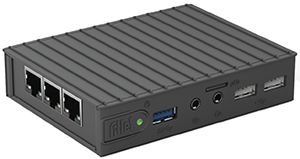

IoT Gateways are hardware and software devices that act as intermediaries between IoT sensors and the Internet. They are responsible for collecting data from connected devices, managing communication between devices and the cloud, and processing and analysing the data, before sending it to the cloud for further analysis.
Various industries use IoT Gateways to act as a central hub that connects IoT devices to the cloud. This means that daily operations, communication, and data transfer are done through the gateway.
Some of the common industries that rely on IoT Gateways include manufacturing, healthcare, IT and networking, retail, transport and logistics, and smart buildings. The use of IoT Gateways is becoming increasingly popular as more devices become connected to the internet.
IoT Gateways perform the following tasks:
• Data collection: IoT Gateways collect data from sensors, devices, and other connected equipment. This is done using various communication protocols such as Wi-Fi, Bluetooth, and cellular networks.
• Data processing: Once the gateway has collected the data, it processes it before sending it to the cloud for further analysis. This can include data filtering, aggregation, and transformation.
• Communication management: IoT Gateways manage communication between devices and the cloud, ensuring a smooth flow of data without any hiccups or delays.
• Security: As with any internet-connected device, security is a top priority. IoT Gateways provide secure connections between devices and the cloud, protecting sensitive data from cyberthreats.
• Protocol translation: IoT devices often use different communication protocols, making it difficult for them to communicate with each other. Gateways act as translators, converting data from one protocol to another, so that all devices can understand and work together.
The use of IoT Gateways provides many benefits for businesses, especially businesses looking to implement an IoT strategy, which is a plan or framework that outlines how a business will use IoT devices and data to improve operations, reduce costs, and drive innovation.
Some of the key reasons why a business needs an IoT Gateway include:
• Improved communication: IoT Gateways act as translators between devices using different protocols. This enables seamless communication and data exchange between devices.
• Enhanced security: With the rise of cyberthreats, security is a top concern for any business with IoT devices. IoT Gateways provide an extra layer of security by securing connections between devices. They can also act as firewalls, preventing unauthorised access to sensitive data.
• Reduced costs: IoT Gateways can help businesses reduce costs by optimising processes and reducing downtime. For example, industrial manufacturers can use IoT Gateways to monitor equipment health, and schedule maintenance before a breakdown occurs, saving time and money.
| Tel: | +27 12 342 3449 |
| Email: | [email protected] |
| www: | www.brandwagon.co.za |
| Articles: | More information and articles about Brandwagon Distribution |

© Technews Publishing (Pty) Ltd | All Rights Reserved